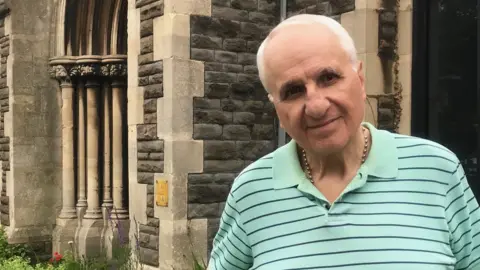Seeking asylum: 'We were told to leave, convert or die'
The stories of five people who fled persecution in their own countries and found sanctuary in Wales are being told via a virtual reality exhibition in Cardiff. Mike Espirion left Iraq after being jailed, tortured and then threatened with death. Here he shares the story of his journey to freedom.
When Mike Espirion was released from Baghdad's notorious Abu Ghraib prison after ten years, he might have thought better times lay ahead.
Saddam Hussein's security forces had tortured him, believing he was a spy, but eventually he was freed.
However, in Dora, the Christian area of Baghdad, Mike, not his real name, and his neighbours had letters put through their doors saying they had to leave, or stay and convert to Islam.
"I left, but many people didn't because they didn't take the threat seriously," he said. "Many of those who stayed were killed."

Mike now volunteers in Cardiff, helping refugees and asylum seekers with advice and interpretation. Whatever their stories, chances are Mike can relate to them because of what he and his family have been through.
It began long before he was born. In 1915, hundreds of thousands of Armenians - possibly as many as 1.5 million - died at the hands of the Turkish Ottoman empire. Among them were four of Mike's uncles. His father escaped and found safety in northern Iraq, raising his family there.
Mike remembers his early years in Iraq as being safe and happy. His father worked as a tailor, and Mike studied business administration before setting up a car rental business.
 Getty Images
Getty ImagesHowever, his clients included foreign visitors to Iraq, which brought him to the attention of President Saddam Hussein's security police. Before the first Gulf War in 1991 they asked him to provide them with the names of all his customers. When Mike refused, things went downhill quickly.
"I was first put in prison for six months," Mike recalls.
"Towards the end of that time I was asked to sign a confession. I said to the man with the confession 'you write what you want' and he had a paper cutter in his hand. He cut me with it, from my ear to my chin. The next thing I knew was when I woke up in hospital."

That was the beginning of Mike's ordeal. Because of his refusal to share the details of his car rental customers, and the fact he had relatives living abroad, the authorities suspected he was a spy.
For the next 10 years he was stuck in Abu Ghraib, being tortured himself or forced to watch others being mistreated.
 Getty Images
Getty ImagesTorture led to nightmares
"They would hang people from fans in the ceiling, or tie them to a bed and beat them with cables as we watched. It made you think about what could happen to you," said Mike.
"You saw awful things, which stay in your mind. It was like being made to watch a film you don't want to see. You would have nightmares."
When he was released, Mike still had to report his movements to the authorities. He had already decided to leave Iraq when a new threat emerged.
"All the Christian homes in Dora were told we had 48 hours to leave or become a Muslim, or you will be killed," says Mike. He doesn't know who was behind the leaflets but didn't stay to find out.
His journey took him to Syria, and then Lebanon where he found sanctuary in an Armenian convent. He lived there for five years before travelling to the UK in 2006.

Minutes from being deported
It was 12 years before Mike was granted refugee status in 2018. During those years he had a long period of being homeless and suffered health problems. The lowest point came when he came uncomfortably close to being sent back to Iraq.
Asylum seekers have to regularly report to the Home Office. One Monday morning when Mike was doing that, he was arrested and taken to a detention facility near Gatwick Airport.
"After nine days, they came and called a series of names - including mine - and told us we were being deported," recalls Mike.
That day is ingrained on his mind. At 8pm he and his fellow deportees were taken to the airport, and just before midnight were loaded onto a plane, each with their own security guard.
While Mike was wondering what awaited him in Iraq, someone at the front of the plane called out two numbers - 51 and 62. Mike's number was 62.
His solicitor had applied to the European Court of Human Rights to have the deportation stopped and at the last minute had been successful.
"It was a miracle," said Mike. "One moment I was going back to Iraq, to the fire. Then I was going back to Wales."
Now with his refugee status approved, Mike is a regular at the Trinity Centre on Newport Road in Cardiff, a haven for people looking for advice.
"I like to help people, to pass on my experience," he says.
"Many of the people who I meet don't speak English, and I encourage them to learn the language. I do it for free and I go anytime they call me, at the job centre or hospital or at the GP.
"I am happy here, and as long as I am breathing I will help people."
The Freedom 360 exhibition with the Welsh National Opera will run from 7 to 30 June at the Wales Millennium Centre in Cardiff. Visitors will be able to experience the stories of persecuted people from across the world who have found sanctuary in Wales.